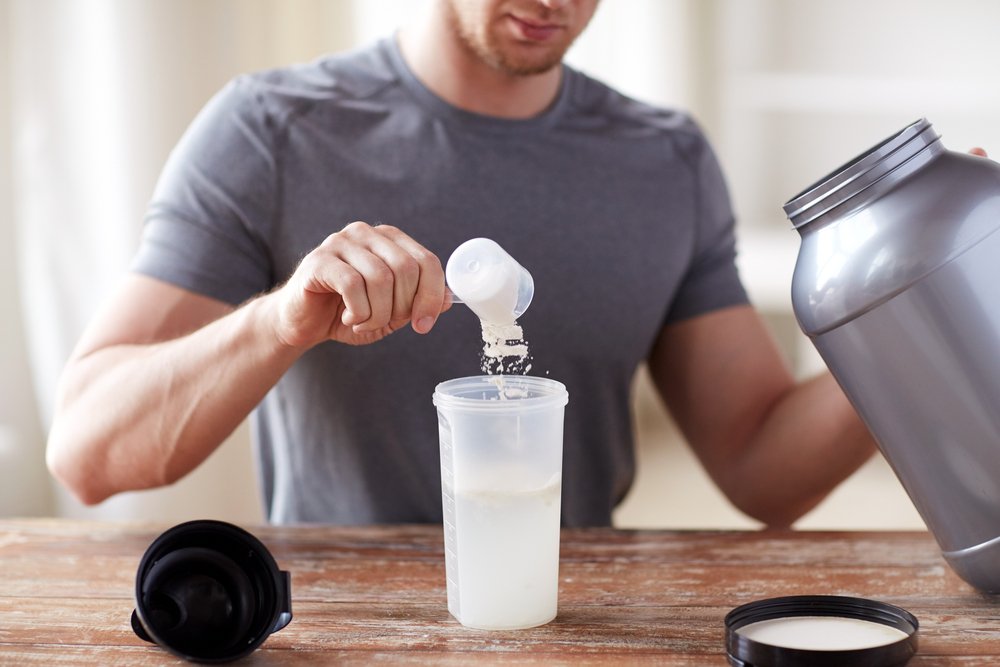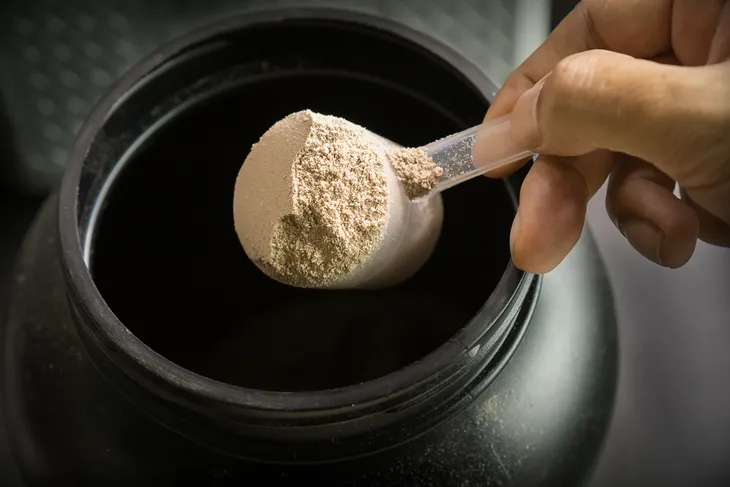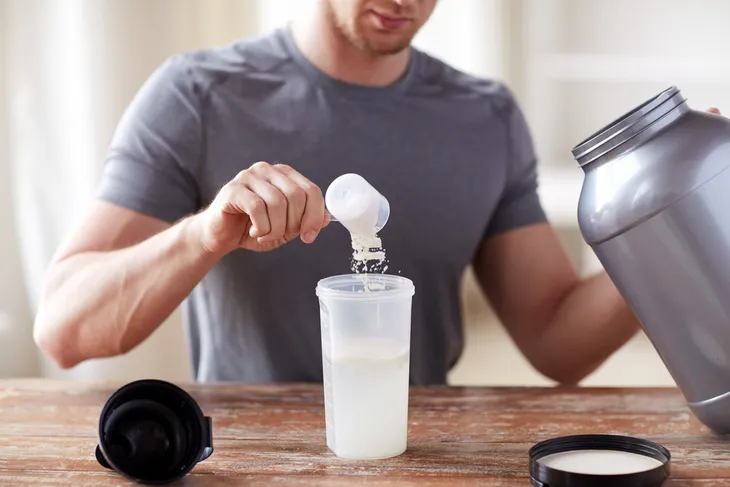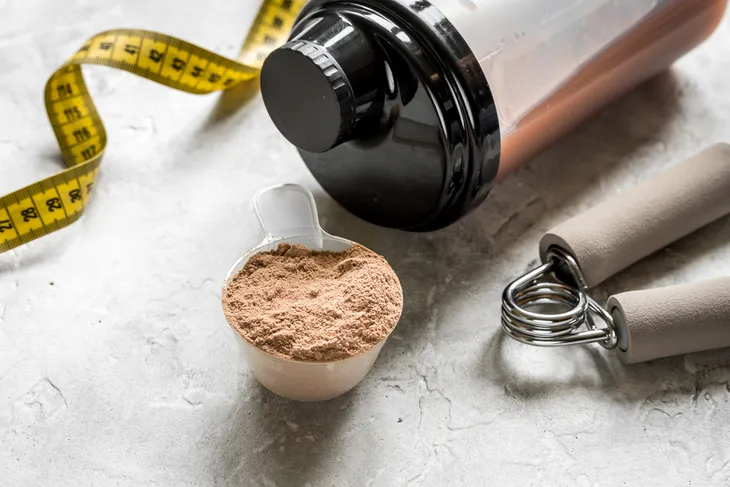The number of protein powders and similar supplements available has exploded over the last few years. They’re heavily advertised on TV and online, with before and after shots hyping up their benefits. Now, major retail and grocery store chains and many health and fitness stores carry these products, claiming they’ll help you lose weight and bulk up quickly.
While some of these products may deliver what they claim, what is the cost? Many have detrimental risks on your health, bringing into question whether these products are actually good for you—they’ve been linked to everything from vitamin deficiencies to heart problems, which should have you thinking twice.
Before you hop on this fitness trend, consider these 10 reasons to avoid protein powders and supplements…
Imbalanced Nutrition
Perhaps the most common and mildest health risk, it’s easy to have imbalanced nutrition when protein powders and supplements are a part of your daily meals. Because your daily protein intake is so high when you consume the supplement, it makes your overall nutrition disproportionate and unbalanced. When you use protein shakes as a meal replacement, you often don’t get the nutritional benefits of a regular meal—such as vitamins, calcium, and other nutrients that balance your diet and are necessary for overall health.
If you’re taking protein supplements, make sure you’re still getting the recommended daily dose of other nutrients. Ensure a balance of fresh and frozen fruits and vegetables, lean and low fat sources of protein (i.e., in meat and milk), healthy omega 3 and omega 6 sources of fat (i.e., nuts, avocados, fatty fish like salmon), and high soluble fiber foods (i.e., oats).
Calcium Loss
Western diets are already on the higher end of the amount of protein consumed that’s considered healthy. Protein plays a vital role in bone strength and is necessary to prevent bone loss. But while protein is integral to bone health, some studies have shown that high protein diets result in an increase in acid production, causing your body to release excess calcium.
A diet that’s balanced with the recommended calcium and protein intake is necessary to protect and strengthen your bones, and avoid osteoporosis. Aside from the potential acid increase leading to the loss of excess calcium, taking protein meal supplements can drastically reduce your calcium intake, posing severe risks to your bones. Much research also recommends that calcium supplements be taken with food, particularly if you are prone to kidney stones.
Weight Gain
While adding protein supplements to your diet can help you lose weight and fat, as well as bulk up muscle mass when you’re following a regular exercise routine, they can also cause weight gain. When using protein powders and shakes as a meal supplement, you’re not only consuming additional protein, but the mixture can also contain additives and excess calories. If you don’t monitor your calorie intake, you run the risk of actually gaining weight instead of losing it.
In addition, because protein powders are known to help you bulk up, you have to be doing pretty intensive muscle training to burn off the calories and build your muscles, to avoid gaining fat instead. In fact, not every novice or aspiring athlete (i.e., runners, bodybuilders, or cyclists) need to incorporate protein shakes into their diets. Remember, if you get more protein than you need to do the exercise you want to do, the extra calories can lead quickly to weight gain.
Heart Issues
High-protein diets can lead to severe health issues, such as heart problems. Though your protein powder or supplement itself may not directly increase your cholesterol level, if you’re using a supplement while still consuming protein during other meals, you run the risk of getting high cholesterol.
And some supplements do have a lot of cholesterol in them, so being aware of what supplements can do to your body is essential. Combining high-cholesterol protein supplements with food that is also high in cholesterol and protein, such as eggs, can pose severe heart problems. In fact, WebMD research suggests that although whey protein can reduce short-term food intake the research is inconclusive and often conflicting. More research is necessary before firm conclusions can be made.
Increased Fat Intake
Have you ever read the nutritional information on your protein shake? If not, you should. While a lot of shakes are high in protein and low in fat, some pre-made shakes contain a significant amount of fat from using whole milk and cream. Protein bars can also contain a lot of fat, and most pre-made supplements, regardless of the form they come in, contain preservatives.
If you don’t have a regular, intense workout routine that will burn off the excess calories and fat from protein shakes, there’s no reason to use them. The excess protein will turn to fat if you don’t burn it all off through exercise. Basically, the bottom line is that you have to burn off the excess calories you eat via protein shakes and bars if you expect to lose weight and not gain weight.
Digestive Problems
Protein shakes and bars are known to cause digestive issues, though they typically don’t cause any long-term problems. Cramping, constipation, bloating and gas are all symptoms that can occur. Protein takes a while to digest, and if you don’t take in enough carbohydrates with your supplement, the longer it will stay, uncomfortably, in your stomach.
People who are lactose intolerant are even more susceptible to digestive problems because popular protein supplements use whey and casein, both of which are derived from milk, which may lead to even more digestive woes. As with any consumable, it’s important to fully read the label and list of ingredients before you decide if the product is good for your diet and lifestyle.
Hidden Ingredients
Protein powders and shakes rarely have a complete list of ingredients labeled on the packaging. In fact, it’s common for a lot of ingredients not to be listed, many of which are additives you’d likely completely avoid in other products you buy. For example, the additive ‘natural flavors’ can encompass so many unwanted chemicals, such as MSG.
Other undesired ingredients can make their way into the product while the powder is being processed. Without national standards and regulations on these products, you probably won’t know what’s exactly in them. This is why it’s vital to research any fitness or health product before you decide to use it. American citizens can look up products, warnings, and research on the U.S. Food and Drug Administration (FDA) website.
Dehydration
Hydration is integral for people who do strength training, cardio and other vigorous exercises, and it can be difficult to stay hydrated when you’re using protein powders to lose weight and bulk up. Studies have shown that protein powders can cause dehydration, depending on consumption and exercise. Your body requires more water to metabolize the excess protein, and without it, you become dehydrated.
Also, additional strain is put on your kidneys if you consume too much protein. This is due to the kidney’s having to work harder to process the excess acid from the supplements. So if you’re set on taking protein powders as part of your health regime, make sure you increase your water intake, even if you don’t feel thirsty.
Not Regulated by the FDA
One of the most alarming facts about protein supplements like powders and shakes is that they aren’t regulated by the U.S. Food and Drug Administration (FDA). Why? Supplements are simply not regulated by the FDA, similar to pharmaceuticals. This begs the question of what, exactly, is in protein supplements, and whether or not the manufacturing process results in producing harmful contaminants.
When companies have free reign over their products like this, you don’t know how a product was tested or how much testing even occurred. Since supplements aren’t a natural product and become the main source of your diet, the unknown risks to your health are concerning. As mentioned, researching any fitness or health product before you decide to use it is always wise. The U.S. Food and Drug Administration (FDA) will post warnings on their website as they come to light.
Potential Exposure to Heavy Metals
Some protein supplement products contain harmful contaminants—specifically, heavy metals like arsenic, mercury, lead and cadmium. A study done by Consumer Reports that included testing 15 protein drinks, as well as interviews with health and fitness experts, found some protein drinks can pose severe health risks from the contaminants found in them. At least one heavy metal was found in at least one sample of all 15 products they tested. While the heavy metals were in small amounts, some products could exceed the maximum daily limit when consumed 3 times per day, something that’s quite common. Some levels were high enough that depending on the state, they would require a warning label.
Ingestion of excess heavy metals is potentially dangerous because they have been shown to raise the risk of certain types of cancer. Research from Kansas State University points to high heavy metal consumption, absorption, or inhalation as increasing the risk of skin, bladder, kidney, and lung cancers.













